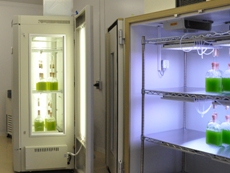September 13, 2013
Sendai City Partners with Universities to Develop Algal Biomass Technology Using Sewage Water
Keywords: Environmental Technology Local government University / Research institute

Copyright Sendai City All Rights Reserved.
The City of Sendai, Miyagi Prefecture, inaugurated on April 24, 2013, the Algal Biomass Technology Development Laboratory in its Minami Gamou Wastewater Treatment Center, which was hit by the Great East Japan Earthquake and tsunami in March 2011. The laboratory is expected to be a base for a collaborative research project with Tohoku University and the University of Tsukuba to develop a recycling-oriented system combining wastewater treatment and energy production technologies.
Under a three-way accord concluded in November 2011, University of Tsukuba is developing an algal biomass manufacturing technique, while Tohoku University studies effective methods of extracting fuel out of algal biomass, and the city of Sendai provides a space and samples of treated wastewater for the research.
Some algae can produce oil that is similar to components as petroleum, with a production efficiency tens to hundreds times as high as those of terrestrial oil plants. Also, algae do not compete with the food supply for resources as there is no need of farmland for its production, and such algal oil could be used not only as fuel or energy source but also for materials for other chemicals.
Aurantiochytrium, an algae discovered by the University of Tsukuba, proliferates not through photosynthesis but from organic matter in sewage or sludge, producing more than ten times as much oil as ordinary algae, while Botryococcus fix carbon dioxide via photosynthesis but grows using nitrogen and phosphorous in sewage water. The research team will establish the technology to use these algae in treating wastewater and, at the same time, manufacturing oil.
Related JFS Articles
Related
"JFS Newsletter"
Related
"Popular Articles"
- New Nano-Bubble Technology May Help Dissolve Sludge and Improve Water Quality
- Japanese Firm Begins Development of Tidal Power Generation System
- Small Hydropower Generation System Developed for Use in Seawater, Weight Cut by Half
- Constructed Wetland Facility Established by Japanese University Purifies Livestock Farming Drainage
- Toyota CRDL Succeeds in World's First Artificial Photosynthesis Using only Water and CO2


